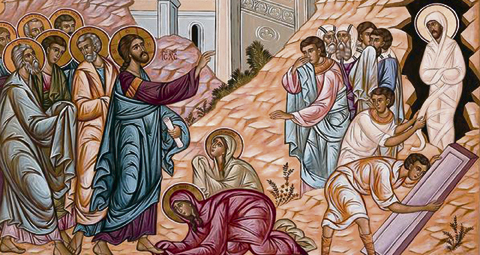March 29 | ![]() 0 COMMENTS
0 COMMENTS ![]() print
print

God as redeemer, not as rescuer
Fr Ronald Rolheiser
Before you get serious about Jesus, first consider how good you are going to look on wood.
That’s a line from Daniel Berrigan that rightly warns us that faith in Jesus and the Resurrection won’t save us from humiliation, pain, and death in this life. Faith is not meant to do that. Jesus doesn’t grant special exemptions to His friends, no more than God granted special exemptions to Jesus. We see this everywhere in the Gospels, though most clearly in Jesus’ Resurrection. To understand this, it is helpful to compare Jesus’ Resurrection to what Jesus Himself does in raising Lazarus from the dead (right).
The Lazarus story begs a lot of questions. John, the Evangelist, tells us the story: He begins by pointing out that Lazarus and his sisters, Martha and Mary, were very close friends of Jesus. Hence, we are understandably taken aback by Jesus’ seeming lack of response to Lazarus’ illness and the request to come and heal him.
Here is the story: Lazarus’ sisters, Martha and Mary, sent word to Jesus that ‘the man you love is ill’ with the implied request that Jesus should come and heal him. But Jesus’ reaction is curious. He doesn’t rush off immediately to try to heal His close friend. Instead He remains where He is for two days longer while His friend dies. Then, after Lazarus has died, He sets off to visit Him. As He approaches the village where Lazarus has died, He is met by Martha and then, later, by Mary. Each, in turn, asks Him the question: ‘Why?’ Why, since you loved this man, did you not come to save him from death? Indeed, Mary’s question implies even more: ‘Why?’ Why is it that God invariably seems absent when bad things happen to good people? Why doesn’t God rescue His loved ones and save them from pain and death?
Jesus does not offer any theoretical apologia in response. Instead He asks where they have laid the body, lets them take Him there, sees the burial site, weeps in sorrow, and then raises His dead friend back to life. So why did He let him die in the first place? The story begs that question: Why? Why didn’t Jesus rush down to save Lazarus since He loved him?
The answer to that question teaches a very important lesson about Jesus, God, and faith, namely, that God is not a God who ordinarily rescues us, but is rather a God who redeems us. God does not ordinarily intervene to save us from humiliation, pain, and death; rather He redeems humiliation, pain, and death after the fact.
Simply put, Jesus treats Lazarus exactly the same way as God, the Father, treats Jesus: Jesus is deeply and intimately loved by His Father and yet His Father does not rescue Him from humiliation, pain, and death. In His lowest hour, when He is humiliated, suffering, and dying on the Cross, Jesus is jeered by the crowd with the challenge: “If God is your Father, let Him rescue you!” But there is no rescue. Instead Jesus dies inside the humiliation and pain. God raises Him up only after His death.
This is one of the key revelations inside the Resurrection: We have a redeeming, not a rescuing, God.
Indeed, the story of the raising of Lazarus in John’s Gospel was meant to answer a burning question inside the first generation of Christians: They had known Jesus in the flesh, had been intimate friends with Him, had seen Him heal people and raise people from the dead, so why was He letting them die? Why wasn’t Jesus rescuing them?
It took the early Christians some time to grasp that Jesus does not ordinarily give special exemptions to His friends, no more than God gave special exemptions to Jesus. So, like us, they struggled with the fact that someone can have a deep, genuine faith, be deeply loved by God, and still have to suffer humiliation, pain, and death like everyone else. God did not spare Jesus from suffering and death, and Jesus does not spare us from them.
That is one of the key revelations inside of the Resurrection and is the one we perhaps most misunderstand. We are forever predicating our faith on, and preaching, a rescuing God, a God who promises special exemptions to those of genuine faith—have a genuine faith in Jesus, and you will be spared from life’s humiliations and pains. Have a genuine faith in Jesus, and prosperity will come your way. Believe in the Resurrection, and rainbows will surround your life.
Would it were so. But Jesus never promised us rescue, exemptions, immunity from cancer, or escape from death. He promised rather that, in the end, there will be redemption, vindication, immunity from suffering, and eternal life. But that is in the end; meantime, in the early and intermediate chapters of our lives, there will be the same kinds of humiliation, pain, and death that everyone else suffers.
The death and resurrection of Jesus reveal a redeeming, not a rescuing, God.
— Ronald Rolheiser, a Roman Catholic priest and member of the Missionary Oblates of Mary Immaculate, is president of the Oblate School of Theology in San Antonio, Texas. His e-mail address is: [email protected]











